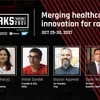How wearables will transform the healthcare space globally
Capturing and organising data from wearables can help empower doctors with more knowledge and insights on a gamut of healthcare functions.
The global wearables market is expected to record a value of$116.88 billion in 2025, rising at a CAGR of 17.12 percent, for the time period of 2021-25, according to an industry report.
Delivering a talk at the 12th edition of YourStory’s TechSparks 2021 on ‘Wearables: How it is transforming Indian healthcare’, Dr Harshit Jain, Founder, and Global CEO, shed light on the potential that wearables have to transform the face of healthcare worldwide.
A physician by training, Dr Harshit pivoted from practising medicine to technology and communication before founding Doceree which aims to change the face of physician marketing globally.
“Wearables can track oxygen saturation, ECG and [many other parameters]; so it’s like we’re connected to a monitor all the time,” said Dr Harshit. The question then arises, how do we use the data and information that is captured and transmitted in real-time?
Future of healthcare data
“Any individual is generating multiple gigabytes of data, every day and hour,” he said. Explaining his perspective, Dr Harshit underlined that this data needs to be aggregated at an Electronic Health Record (EHR) which can match the data to each patient. Through a more organised structure, doctors, government initiatives and patients can get access to this.

“The EHR would become the interface to make that data useful and a physician sitting in a hospital will be able to access the data in real-time,” he added. Overcoming geographical barriers to accessing medical help is one of the many advantages such a system would provide.
Data is knowledge and knowledge is power, emphasised Dr Harshit, adding that this ecosystem would support doctors and arm them with more knowledge. “Data becomes power when it comes together; when it is all lying separately, it may not make sense to anyone,” he remarked.
Furthermore, there is a whole gamut of health functions from fitness and dietary routine to chronic illness management, that wearables and data can assist in.
Safety and privacy concerns continue to be important factors when it comes to data sharing. He opined that we are in the early stages of the development of data from multiple sources including wearables, labs and hospitals now being able to come together.
As the field evolves, governments are also looking to implement and execute policies to enable it but also protect people. Dr Harshit cited the Open Data Act passed by the US government in 2018 which outlines how they want different app developers to start using the data being generated by people for more research and improve the health of people.
“I’m very fascinated with the way the development and organisation of data is happening in India,” Dr Harshit said. He feels that the country is in a position of strength because we have started organising data before it began to disorganise.
If we play our cards right, he believes that we will be in a superior position in terms of data gathering, data insights and improving the quality of care.
To log in to our virtual events platform and experience TechSparks 2021 with thousands of other startup-tech enthusiasts from around the world, join here. Don't forget to tag #TechSparks2021 when you share your experience, learnings and favourite moments from TechSparks 2021.
For a line-up of all the action-packed sessions at YourStory's flagship startup-tech conference, check out TechSparks 2021 website.









